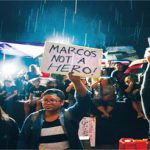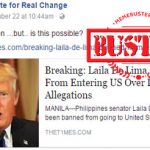Facebook user Adelaimar C. Arias-Jose painted a picture of what was “normal” during Martial Law on November 20. She narrated what it felt like what the first day of Martial Law was like on September 21, 1972, how it marked the start of “living afraid” being normal.
[ads1]
“Imagine waking up on September 21, 1972 and all was quiet. We lived on Shaw Boulevard and the street was deserted. No one was on the street.
In the house, all was sullen. Mama lay in bed and kept me there with her. I couldn’t go out to buy pandesal. The bakery was closed. The taho vendor did not pass by. All was quiet.
Trucks with soldiers passed the street. Policemen gathered at the corner. Everyone’s door was closed. I was five. That morning was the first time I saw my mother afraid.
My father used to be a policeman. He had just become a lawyer four months before. He, too, was afraid. Something happens to a child when she sees her parents afraid. She learns to be afraid, too.
No one in my family was taken, arrested, detained, beaten up, tortured or raped. But we were all afraid. Living afraid was normal.”
She also narrated how daily life was like back then, from lining up to buy rice and sugar because “everything was controlled” to planting vegetables due to Marcos’ Green Revolution.
“We lined up to buy rice. We lined up to buy sugar. In those early days of Martial Law, everything was controlled. After a few weeks, the fear became our normal. My dad needed to take a road trip to preach somewhere. They had a car but no gasoline. He buys the gasoline stub of a policeman friend. It was his gasoline allowance for the mobile police car. I asked, what if the policeman needed to chase a bad guy? Then the people who complained to the police will have to give the policeman “pang-gasolina,” “pang-sigarilyo,” or “pang-meryenda.”
When teachers told us to plant vegetables in the school garden, it wasn’t because it was fun, it wasn’t because it was a learning experience, it was because of the Green Revolution and there would be inspections. We could receive awards if we grew the best vegetables. Life was normal.”
Street-sweeping was required not to teach civic duty to the students but because “sa ikauunlad ng bayan, disiplina ang kailangan.” No one complained.
“When teachers told us to sweep the street, no one asked why. Every student was out on the street sweeping. We didn’t do this out of civic duty, we did it because “sa ikauunlad ng bayan, disiplina ang kailangan.” A few months of this, and we didn’t ask, we didn’t complain, we didn’t question.”
Students were required to make Philippine flags and stand under the heat of the sun while waiting for the dictator’s car to pass by their street and it was, again, normal.
[ads1]
“When we were told to make Philippine flags from colored paper and made to stand for hours in the heat along J.P Laurel Street so we can wave at the passing black car where the dictator and his wife rode, no one complained. No one asked why. No one complained. No one questioned. This became normal. This was life and it was normal.”
And for their source of news was limited to the government stations and the stations owned by Marcos cronies.
“The news? Well, the only source of news was the same government stations, those owned or operated by friends and cronies of Marcos. The only newspapers that survived were those that sang the praises of the dictator. All the news came in press release form and no one wrote the news, they just read the press releases.”
Arias-Jose said that all those who dared to question the government ended up dead after being labeled as communists, leading to the conclusion that “everyone who was evil was a communist.”
“All those who turned up dead and found in the talahiban, well, they were all communists, anyway. Good riddance. All those rounded up for questioning, well, they were all communists, too. Everyone who questioned or complained was a communist. Pretty soon, everyone who was evil was a communist.”
What’s a communist, Mama? Communists are people who want to overthrow the government, but Marcos saved us. Marcos saved the government. Now the communists want to overthrow Marcos. A communist is a person who wants to overthrow the Bagong Lipunan. This was normal.
May bagong anyo,
may bago nang diwa
Bagong bansa,
bagong galaw,
Sa Bagong Lipunan.
Nagbabago ang lahat
Tungo sa pag-unlad
At ating itanghal
Bagong Lipunan!She, along with other Filipinos, believed that they were all safe after communists were jailed. It was what “peace and order” was like during Martial Law.
“We grew to believe that we were all safe because all the communists would be rounded up and they would be jailed. We needed not fear. Life was peace and order.”
Those who said they missed the buns and milk distributed to schools during Marcos’ time? Here’s what Arias-Jose has to say about those.
“School kids were given a bun and a glass of milk everyday. No one asked where they came from, if they were international food aid or if they were from utang. Marcos was so good to the poor. This was normal.”
What else was normal?
Marcos’ debts for the construction of various buildings; lessons about Marcos’ bravery during the Death March, which turned out to be fictional; threats from adults to kids using the police; Marcos issuing Presidential Decrees instead of the parliament or senate doing the legislation.”
“The government was deep in debt to finance the construction of the CCP, the PICC, the FAT, ECP. We had to memorize all those acronyms in school. We had to learn all the cabinet secretaries’ names. We knew all about Marcos’ bravery during the Death March — never mind that it turned out to be fiction, we memories it in school. This was normal.
I was watching cartoons or Sesame Street, and suddenly my favorite program would be interrupted and a man sitting in a chair behind a desk would give a speech for an hour. I would groan and sometimes get angry and complain. I would be shushed. The soldiers might hear you. If we misbehaved, older people would say, sige ka, dadalhin ka sa Camp Crame. Tatawag ba ako ng pulis? Ipadadala ba kita sa Crame? This was our normal.
I would often hear, that same man with the big voice and slow cadence of speech say, “I have ordered the Armed Forces.” He would say, “I have issued Presidential Decree number so and so.” It was so normal. I grew up thinking that laws were made by Presidential Decree. I didn’t know until I was 15 that laws elsewhere, in other countries, were made by a congress or a senate or a parliament. I thought Presidential Decrees were normal.”
If you’ve read about Martial Law, you might have heard about how some people commented on the “quiet life” during that time.
“So when older people say, “Naku, during Martial Law, life was quiet,” believe them. There was only one voice to be heard. When they say, life was peaceful during Martial Law, believe them. Everyone who questioned was in jail or in a shallow grave somewhere.”
Cheap prices during the martial rule?
“When they say, “naku, noong Martial Law, mura ang bilihin” believe them. Malacañang controlled everything even the price of rice, and sugar and cooking oil. Everything was controlled and owned by the government or some lucky friend, classmate or kababayan or kamag-anak of the man in Malacañang.”
People still enjoyed freedom during Martial Law? Here’s what Arias-Jose has to say about it.
“When people say that they were free during Martial Law, believe them: they were free to choose Seeing Stars with Joe Quirino or Superstar; they were free to root for Toyota or Crispa; they were free to watch the news on RPN 9 or IBC 13 or BBC 2 or PTV 4 or GMA 7 the news would contain the same footages and the same press releases anyway.”
And one other thing that was normal during Martial Law – palakasan system.
“You know what else became normal? When you needed some help getting something you need from a government agency, you would ask, “sino bang kakilala natin doon?” or “May kakilala ka ba sa Malacañang?”
But later, it became different. The teenager who ran over a child on the street would not be prosecuted, the family will not press charges, kasi, “pamangkin ni Colonel so and so.” Nakagitgitan sa traffic? “Anak ni General so and so iyan” This, too, was normal.
You wanted a government job? You don’t have qualifications? That’s not a problem. Kilala mo naman si….kumpare naman ng tatay mo si…ninong mo naman si…it doesn’t matter what you know, it matters whom you know. This, too, was normal.”
Arias-Jose concluded her post: “So, life during Martial Law was normal. Everything was normal.”
[ads3]


